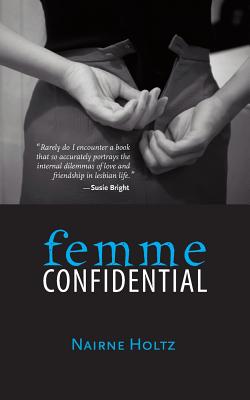 Femme Confidential
Femme Confidential
by Nairne Holtz
Insomniac Press. 290 pages, $19.95
THE TITLE of this novel bristles with promise. It suggests a lurid paperback from the 1950s or ’60s about a secret network of female sex perverts. However, the author’s writing style is deadpan and understated, and the time-span ranges from 1981 to 2014, with a flashback to 1977. In the course of the narrative, we watch a group of young queer people, mostly women, develop identities and relationships of various kinds in the city of Toronto, which changes from one era to another. Three characters are in the foreground, and only one uses “I” to tell her story.
That character is Liberty, whose background comes closest to that of the author. She grows up in working-class Nova Scotia as the daughter of Quaker expatriates from the U.S. After losing a job and leaving college, she hitchhikes to Toronto with a young man who is “mostly gay” and mostly broke, and survives with no support from her family. Liberty is the only person in her queer urban demimonde whose parents have never disapproved of unconventional lifestyles, but apparently she is not one of the “causes” they believe in.
Interspersed with chapters told by Liberty are third-person chapters that focus on her friends and lovers. Veronika, the glamorous daughter of a widowed Hungarian mother, develops punk style as a teenager in the 1980s and moves to Toronto, the urban mecca. Liberty meets Veronika: “It was summer and I was twenty and so was she, and we had met at the twenty-four-hour diner where I worked.” Veronika flirts noncommittally with Liberty in a club, then breaks into Liberty’s shared apartment, and writes in her journal.
Veronika and Liberty weave in and out of each other’s lives as Liberty studies library science and acquires better jobs as a result. Early in her confusing relationship with Veronika, Liberty tries to distract herself with a young man named David, who “comes out” as a transwoman named Dana just after Liberty breaks up with him. She tells him she is a lesbian, and he tells her that a relationship with him wouldn’t threaten her sexual identity. Breakup scenes have rarely been this awkward.
Despite their great capacity for hurting each other, Liberty, Veronika, and Dana become a stable trio of friends who share a home. In various sexual relationships with women who are all butch in one style or another, Liberty acquires confidence as a femme. The memorable sex scenes look natural in their narrative context.
This novel is not quite a bildungsroman and not quite a saga about urban queerness in the past four decades, but it is coherent. Events that seem momentarily surprising are shown to have been predictable. In time, Dana fathers a child, and Liberty discovers a talent for sexually dominating women who want her to. Gender roles and BD/SM are never faddish or arbitrary in this novel; they arise from the characters who embody them.
After a bondage workshop in 2014, Liberty muses on her relationship with the butch to whom she is now married: “I understood wanting a safe space—any person who has been treated like shit would. Safety was the price I’d demanded from Beth to be her wife. And when she stroked the center of my back, as she was right now, I felt utterly safe, precious, protected. When something crappy happened, I wanted Beth the way a two-year-old wants their mom, something I’d never felt about anyone else, something I could barely stand to admit.” Only at the last page does the reader fully understand that there are no heroes or villains in this fictional world, no sick puppies or paragons of mental health and political correctness. While it captures a contemporary zeitgeist, this book seems likely to last.
________________________________________________________
Jean Roberta is a widely published writer based in Regina, Saskatchewan.





